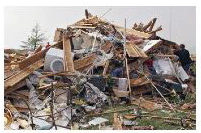"Have You Been Short-Changed
On Your Insurance Claims?"

Insurance claims are one of the more arcane and secret areas of the insurance industry, and often shrouded in technical language that is unintelligible to the insurance customer. It is also one of the biggest profit centers for the insurance industry by way of short-changing the claim, adjusting it downward.
When you make a claim to your agent, he/she forwards it to the home office who in turn assigns it to the Claims Department who will send a salaried adjuster (employee) out to the scene of the loss. Claims adjusting is an art. The artsy-part is getting you to happily accept less than what your claim is worth so you will keep paying the premiums, and believing you have been treated fair and square.
Most people have an innate suspicion that they have been screwed on an insurance claim at some point in their insured lifetime but can't quite point to the evidence of how the slight of hand was accomplished. Most insureds don't understand the nature of relationships and who has loyalty to whom so they proceed to deal with the adjuster directly. If you have a sizable insurance claim, this is a huge mistake.
The Public Adjuster
The best kept secret in the insurance industry is the fact that the insured can hire a Public Adjuster to represent them on their insurance claim. They will charge you a small percentage of the amount of the claim as finally settled—which will usually be far more than you could get yourself. What is a public adjuster?
"Public adjusters represent claimants only in presenting their claims to insurer."
— Black's Law Dictionary, Sixth Edition
The insurance company employee adjuster from the claims department has no interest to see that you get a fair and equitable insurance claim settlement on your loss. Of course, this is contrary to what all insurance companies advertise. The public adjuster, working for, and loyal to only you, has only your interest at heart. He/She doesn't make more money by slighting you. He also knows all the secret adjusting tricks and portions of the standard policies where hidden coverage is always overlooked by the company adjuster because they know that you don't know about those coverages. What you don't know can always harm you. Furthermore, he/she will have up to date data on what repair and replacement costs in your area currently are running.
Once you hire him/her for your claim, the insurance company will take a completely different stance on their loss for the reason that if the case ends up in the courts, you have an expert witness on your side that has been working for you since the inception of the loss. The public adjuster is worth every cent you agree to pay them and public adjusted claim cases rarely end up in court. Too much evidence is in the hands of the public adjuster regarding your claim that will come out on the public record. The last thing the insurance company wants is new case law on the books regarding their shyster tactics.
Often, public adjusters will be listed under the category of independent adjusters who most often work on disaster area claims for insurance companies who don't have a large enough claims department to handle the load. At other times, they are more than happy to represent your claims.
If you have a major claim for property damage, consider hiring a public adjuster to represent and interface for you with your insurance carrier. You will come out far ahead of representing yourself in most every case.
❖ Testimonials ❖
We have been following your blog and we have found a lot of useful information in it.
Cecil Sibanda
Product Coordinator
Dorman Products, Inc.
Colmar, PA
I was pleased that I was able to easily find the proper tall storage cabinet for my garage. I needed lockable storage to keep my toddler away from sharp tools and solvents that my husband stores. Garagetips-101 solved my problem!
Renee M.
I love the detail in your garage building pages. They helped me understand how to engineer a foundation for a garage we are planning that our building department will approve. I had the inspector go to your pages and review what I was talking about. Now, I am studying the wall framing sections, as we plan to build it ourselves this fall. Thank you so much for the great information.
R.G.,
Des Moines, IA
Great stuff on wall framing. I never really understood the on-and-off spacing concepts for the wall studs until I read your explanations.
Will,
Grand Island, NE





